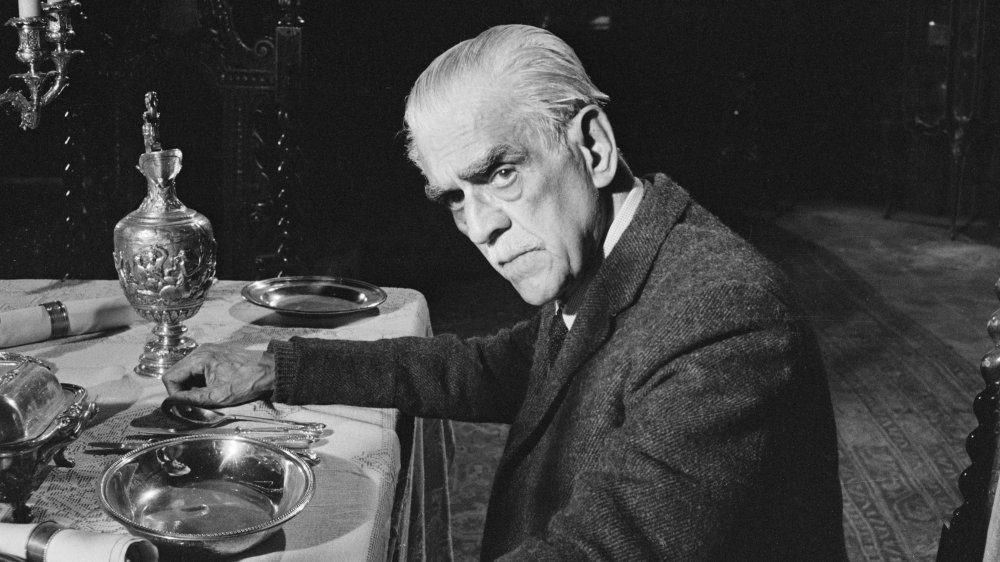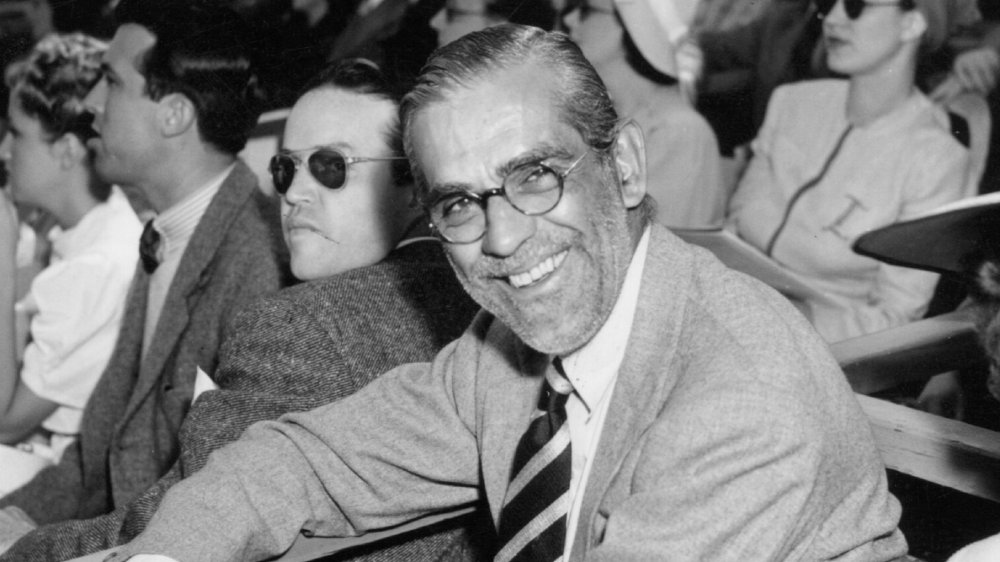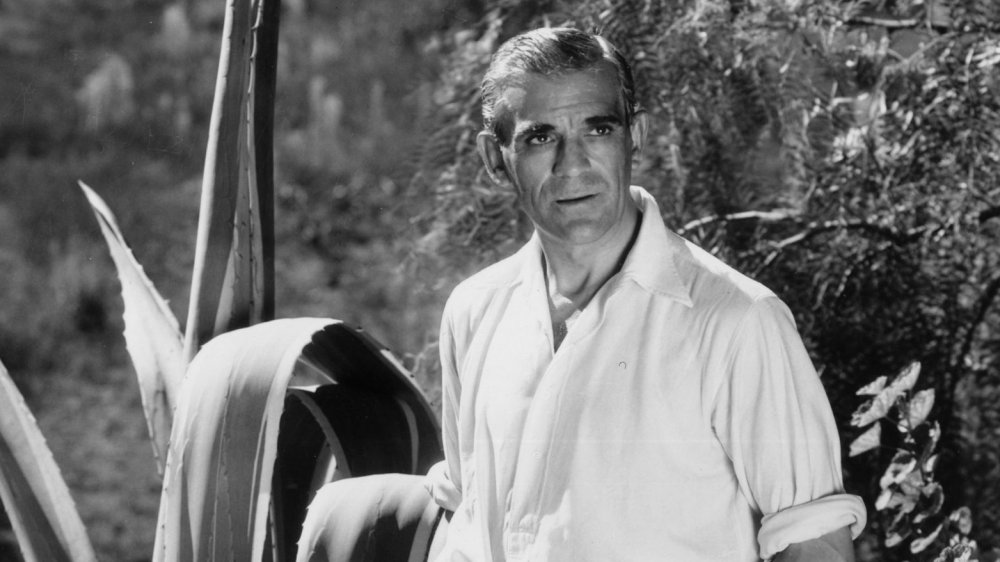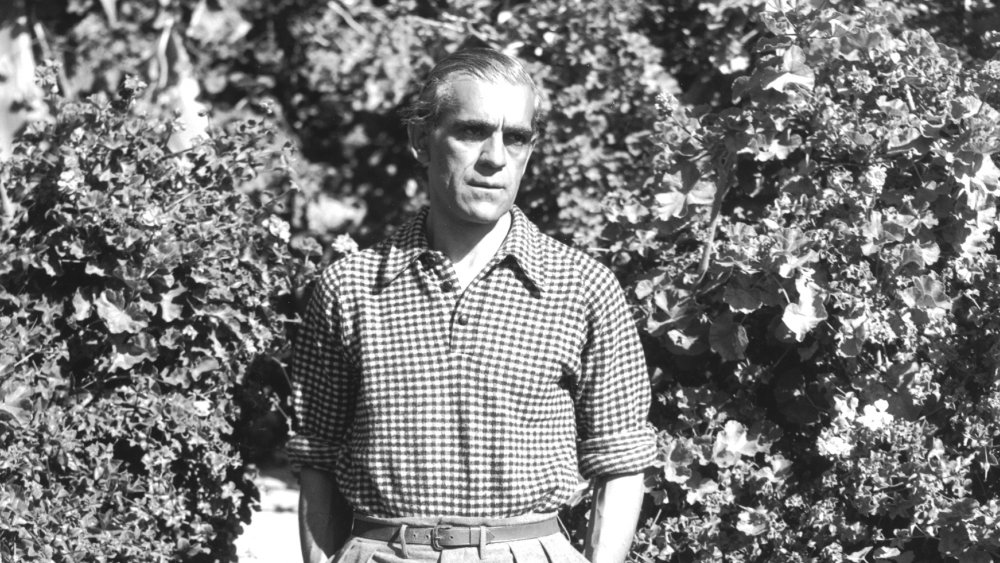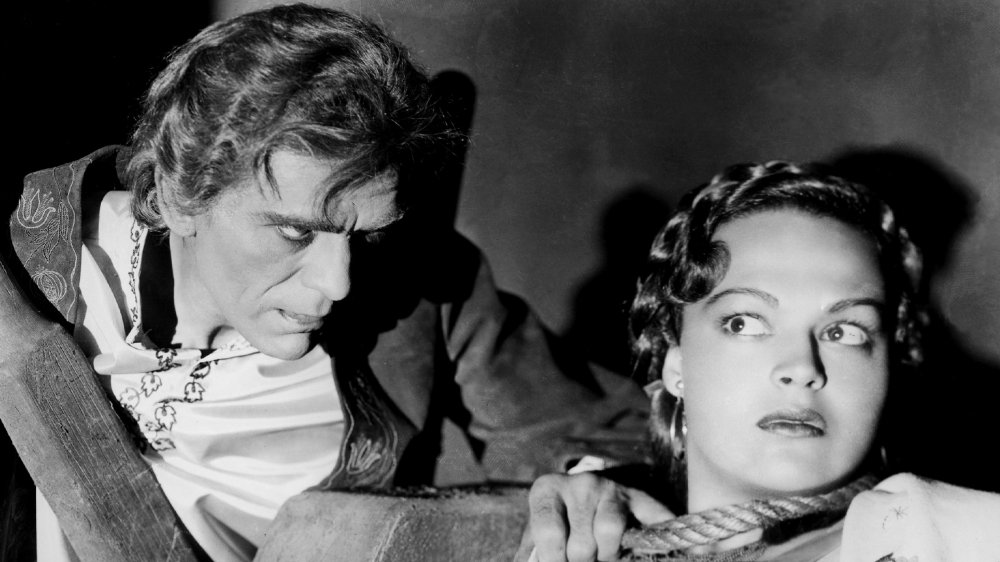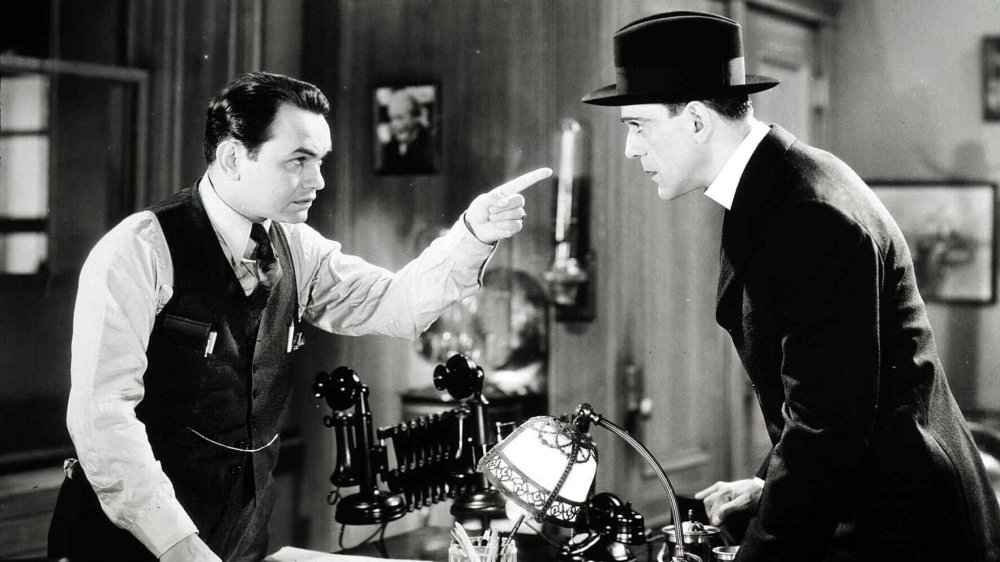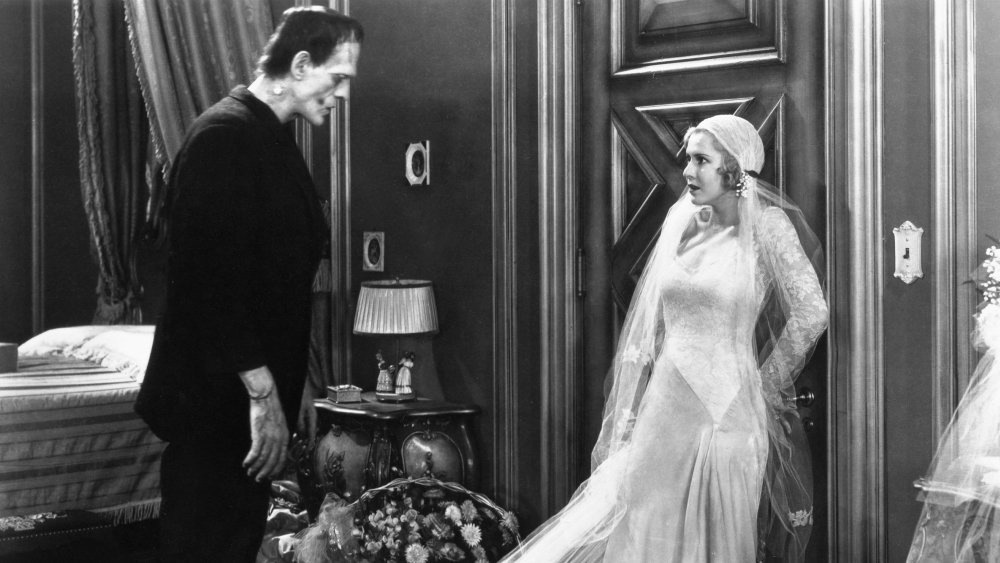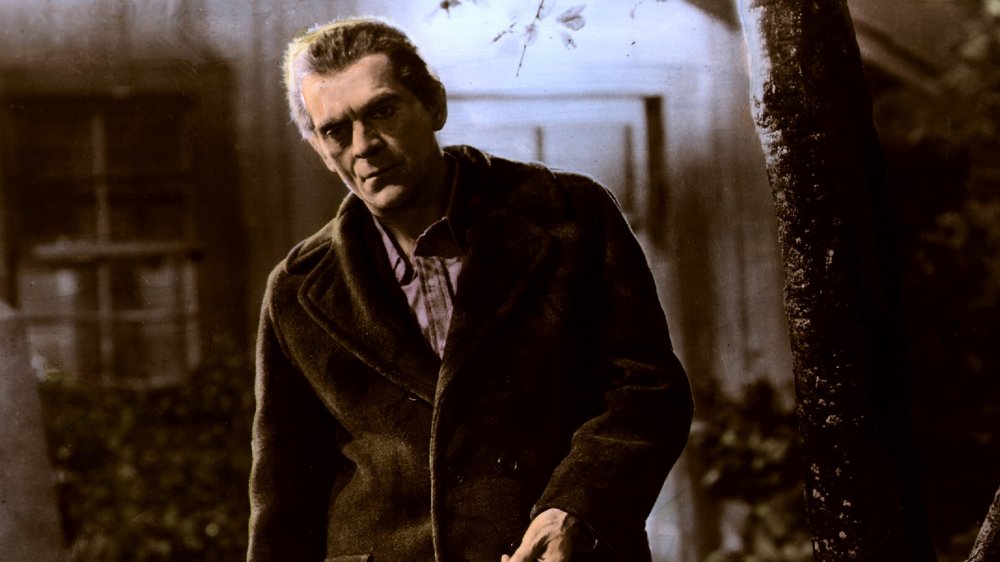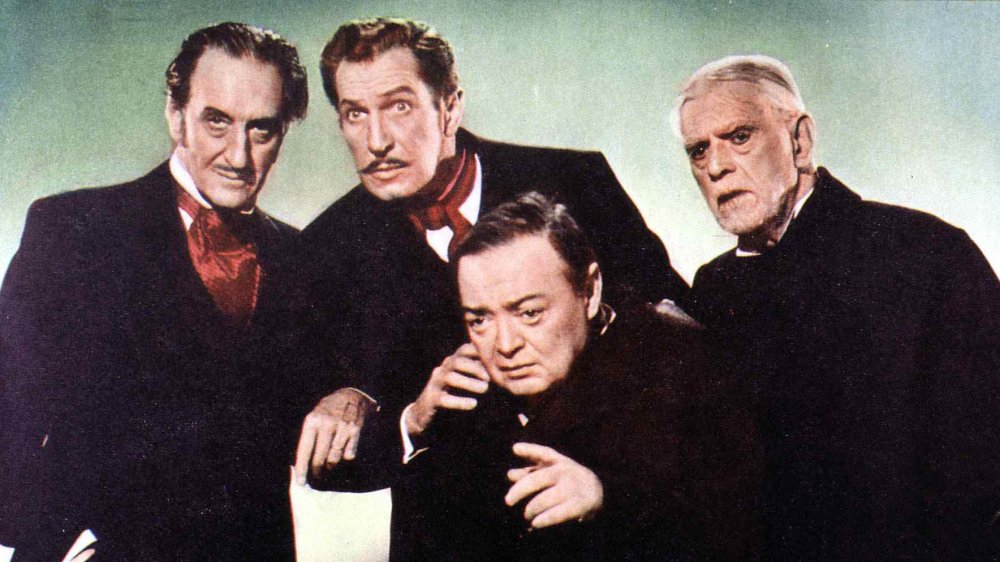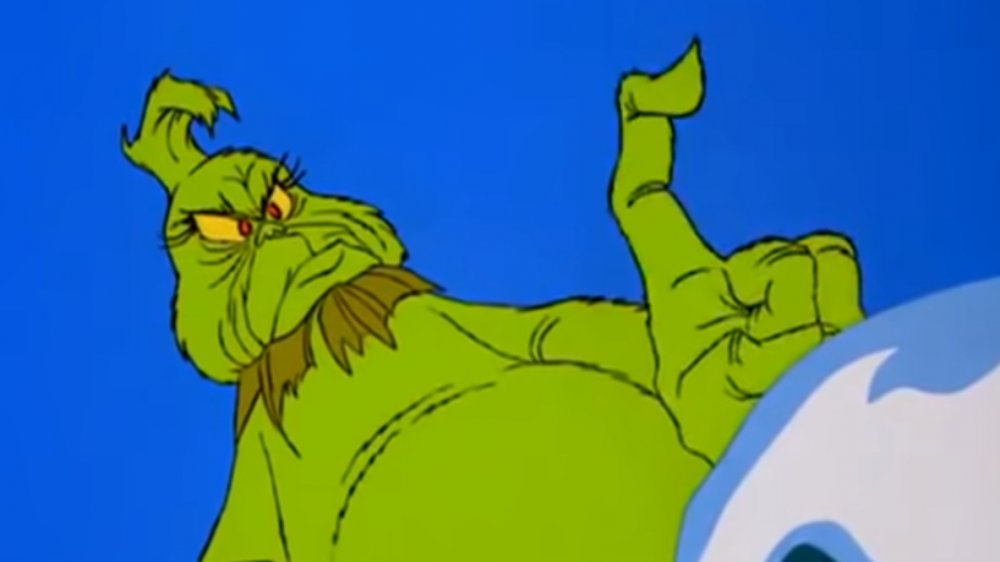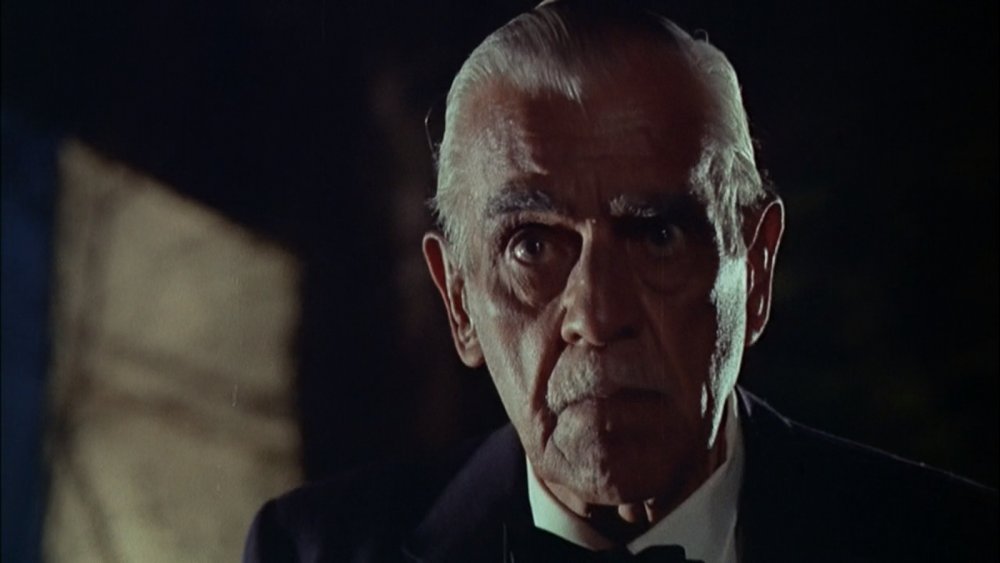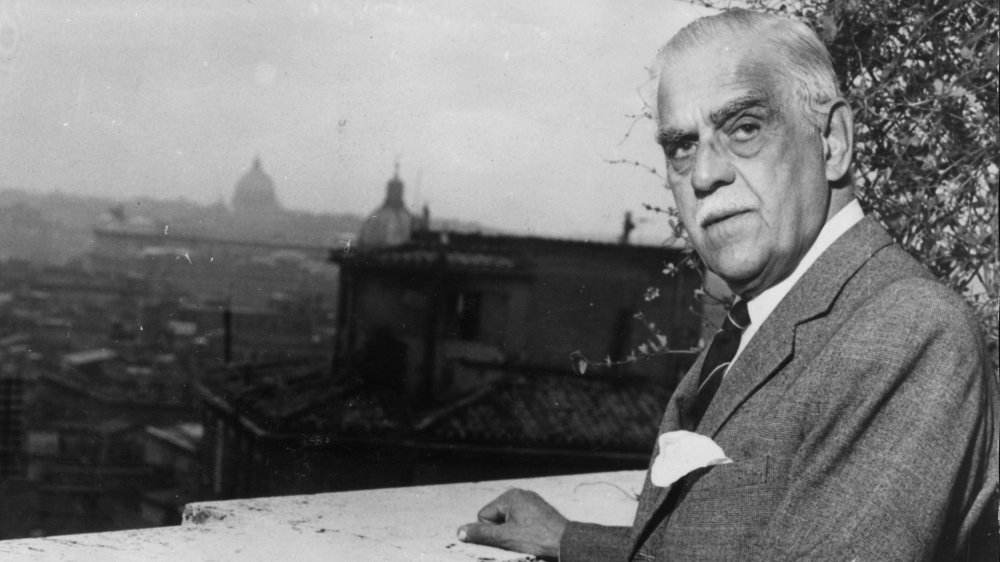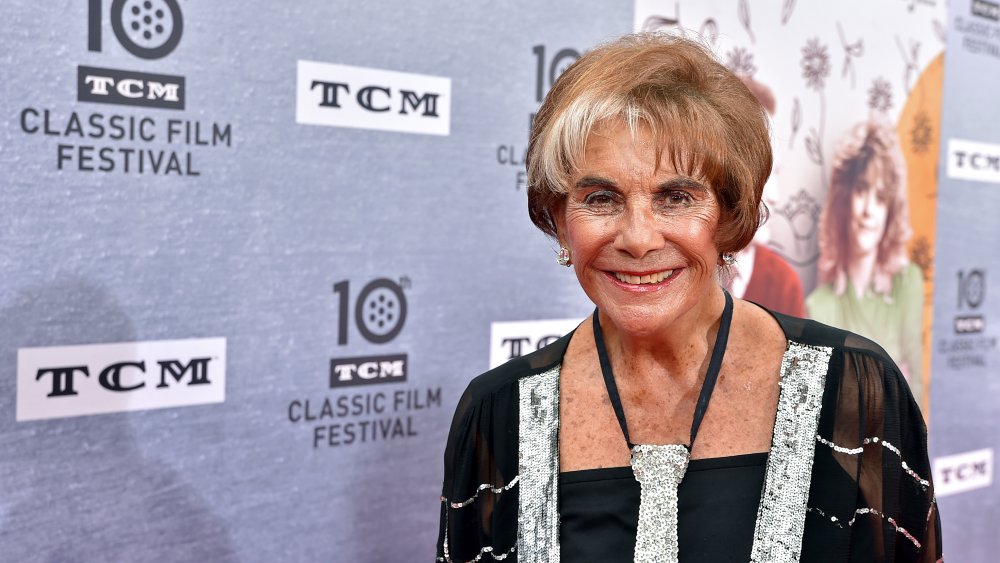The Amazing Story Of Horror Legend Boris Karloff
Described by those who knew him as dignified, warm, and elegant, Boris Karloff lived a life of sublime contradiction. His definitive performance as the greatest movie monster of all time defined the golden age of horror. Yet, behind the iconic makeup of Universal's 1931 classic Frankenstein and the lifetime of sinister movie roles that made his career, Boris Karloff was anything but frightening. Beloved by his peers for his kindness and humor, the actor born William Henry Pratt was, above all, the consummate English gentleman.
Whether terrifying moviegoers in one of his patented villainous roles or delighting generations of kids as the narrator of the 1966 holiday favorite How the Grinch the Stole Christmas!, Karloff always performed at the peak of his considerable abilities. With a workmanlike approach to his profession, he believed it was an actor's duty to act. Although this attitude may have led to Karloff appearing in some films of questionable merit, especially late in his career, it also kept the aging actor relevant and active while many of his horror movie contemporaries faded into obscurity. And, while some actors lament being pigeonholed in spooky roles, Karloff was grateful for the genre and the fans who gave him fame and fortune.
A half-century after his passing, his shadow still looms large in the public imagination. As Frankenstein's monster, as the mummy, as innumerable fiends and madmen, Boris Karloff's influence on horror cinema and pop culture as a whole is unparalleled. This is his amazing true story.
Boris Karloff's surprising childhood and heritage
Boris Karloff was born William Henry Pratt in Camberwell, South London, on November 23, 1887. The youngest of nine children by five years, Karloff grew up virtually an only child. His father, Edward John Pratt Jr., was a career diplomat who was seldom at home. Edward Pratt, a domineering Englishman of mixed Indian descent, was often critical of his son. Cynthia Lindsay, author of the 1975 biography Dear Boris: The Life of William Henry Pratt a.k.a. Boris Karloff, writes, "(Karloff's) entire association with his brothers and his father took place when one or another of them . . . observed him as if under a microscope and muttered, 'Something's got to be done about that boy!'"
Karloff's mother, Eliza, whom Edward Pratt met while working in the diplomatic service in India, was frail and often ill. Consequently, young Billy Pratt looked elsewhere for a sense of family. As a child, he spent much of his time at the home of his friend Noel Hearns. "He was very shy," Hearns told Cynthia Lindsay of her childhood friend. "... He was, I think, a very lonely little boy."
Bowed legs, a stammer, and a lisp served to set Karloff apart from his peers. His dark complexion was also a frequent subject of discussion among his schoolmates. When asked about his "sun tan," Karloff, in an effort to hide his Indian heritage in the racist, upper-crust Victorian society, would good-naturedly quip that his coloring resulted from "plenty of gin and a tight collar."
Karloff studied to be a diplomat
When Boris Karloff was five years old, his father abandoned the family to live in France. Eliza Pratt succumbed to illness just two years later leaving her youngest son in the care of his stepsister. Karloff's seven brothers, all prominent government servants, and family tradition dictated that he was to pursue a career in the British Consular service.
In preparation for his career in diplomacy, Karloff attended Uppingham, a boarding school in Rutland, England, before departing for King's College of the University of London. Nevertheless, the would-be diplomat's love of theater outweighed his academic endeavors. "... The first-term reports amply reflected the fact that I had attended more plays than classes," Karloff told The Saturday Evening Post in 1962. "I was, in fact, fast becoming a disgrace to the family name." When Karloff failed his important first term examinations, his reaction was one of relief rather than disappointment. He had long before determined that his destiny was on the stage not in an embassy. He would later admit to flunking out on purpose.
Despite Karloff's insistence that he held a "disinterest in any profession based upon higher learning," the actor's formal British education served him well in ways outside of academia. He left school a proper English gentleman with the bearing and manners that would serve him well throughout his life. Boris Karloff may have been a black sheep, but he was a black sheep with breeding. "I would have made a hell of a Little Lord Fauntleroy," Karloff joked. "I was trained for it."
Young Boris Karloff was a drifter
Boris Karloff's theatrical ambitions scandalized the Pratt family. One of Karloff's brothers, George, had tried his hand at acting before returning to a much more "sensible" career in city government before dying in 1904, per Karloff.com, and his perceived failure was held up as a cautionary example. To his siblings, Karloff's dream was, at best, mere folly, and, at worst, a potentially shameful blow to the family name.
Undeterred, 21-year-old Karloff collected about 100 pounds bequeathed to him by his late mother, and let fate decide his destiny. "In those days black sheep were exported to Canada or Australia. When I blithely flipped a coin in the family solicitor's office, the unfortunate losers were the Canadians," Karloff stated in a 1962 career retrospective.
A month later, Karloff found himself in a Canadian pasture working as an itinerant farmhand. Raised in an atmosphere that was anything but rustic, he learned on the job. Soon after, Karloff traveled to Vancouver, British Columbia, where he took a job clearing land and digging drainage ditches for the B.C. Electric Company. As a laborer, Karloff questioned the value of his upper-class upbringing. In Boris Karloff: The Man, The Monster, The Movies, biographer Denis Gifford quotes Karloff as saying, "Uppingham ... tried, heaven help them, to teach me Latin and history and all sorts of things, but nobody ever showed me how to use a pick and shovel. And at one time, my existence depended on being able to use a pick and shovel."
Boris Karloff, actor at last
With virtually no stage experience or prospects for finding work in the theater, Boris Karloff eked out a meager living in a variety of back-breaking jobs. The educated, young Englishman took on any paying labor that came his way from digging ditches to laying railroad tracks. As his finances dwindled, a chance encounter with his brother John, who was winding his way back from China to London by way of Canada, netted the struggling Karloff a much-needed loan of $50 in 1910. The windfall afforded Karloff the chance to probe the theater scene in Vancouver.
While thumbing through a copy of Billboard, Karloff stumbled across an ad for a theatrical agent located in nearby Seattle, Washington. Making the short trip to Seattle, Karloff concocted a complicated tale to get his foot in the door of the theater scene. Explaining that he was a successful actor of the London stage in Canada convalescing from a sickness, Karloff spun a tale of triumphant West End performances and critical accolades. Having fully recovered, he was now ready to conquer North America.
Unsure if his gambit worked, Karloff returned to work clearing land as part of a surveying team in a mining town called Kamloops 160 miles outside of Vancouver. Two months later, he received a letter from the Seattle agent telling him to join the Jean Russell Stock Company. An actor, at last, Karloff left his ax in a tree and walked off the job.
Boris Karloff goes to Hollywood
Feeling that "William Pratt" was too bland a moniker, the young actor took the surname "Karloff" allegedly from a maternal relative of Russian descent. However, Karloff's daughter, Sara, asserts she can find no such relatives. He chose "Boris" for its exotic ring. With his new stage name in place, Karloff was ready to embark on his dream career.
Unfortunately, his time with the Jean Russell Players was cut short by tragedy. According to the Biography documentary Boris Karloff: The Gentle Monster, in the summer of 1912, a devastating tornado struck Regina, Saskatchewan, killing 41 people and leveling the troupe's theater. Karloff briefly returned to manual labor but was soon back on stage with the Harry Sinclair Players. After three seasons with Sinclair, Karloff moved to the United States in 1913 where continued his theatrical career in Chicago.
After his short stint in the Windy City, Boris Karloff migrated west to Los Angeles, the capital of the rapidly expanding movie industry. By 1919, he was working regularly in film as an extra and in bit roles, but he was by no means a movie star. "He was absolutely poverty-stricken and hungry most of the time," author Cynthia Lindsay told Biography in 1995. "But, he had what he always called the fire in his belly for the craft."
By 1930, Karloff, now in his 40s, was still supplementing his acting income with a variety of jobs. Despite a few prominent roles, Karloff, with 80 movies on his resume, was a relative unknown.
Frankenstein made Karloff a star
By the early 1930s, Boris Karloff's fortunes, at last, began to change. A featured role in Howard Hawks' prison thriller The Criminal Code, released in 1930, garnered the struggling actor some much-needed visibility. Among those paying attention to the menacing actor was an up-and-coming director named James Whale.
Whale, hot off back-to-back hits with Journey's End and Waterloo Bridge, had so impressed Universal Studios head Carl Laemelle, Jr. that the wunderkind film exec gave him a five-year contract and his choice of any property owned by the studio to direct. Looking for a dramatic challenge and a chance to "dabble in the macabre," Whale chose Frankenstein. Although Universal considered it a foregone conclusion that their biggest horror star, Dracula's Bela Lugosi, would play the monster, the dashing Hungarian actor passed on the role citing the coarse character's lack of dialogue.
Spotting Karloff having lunch in the Universal commissary, Whale sent an assistant over to schedule a meeting with the actor over coffee. Familiar with Karloff from The Criminal Code, the director explained that he wanted Karloff to do a screen test for the role of Frankenstein's creature because, in Whale's words, the actor's face had "possibilities."
Frankenstein, released in 1931, was another success for James Whale and a financial blockbuster for Universal. The combination of Jack Pierce's gruesome, flat-skulled makeup and Karloff's terrifying, yet pathos-tinged performance captured the imagination of the world. Karloff, approaching his mid-40s, was now one of Hollywood's biggest stars and a household name.
Karloff, horror hero
Thanks to the runaway success of Frankenstein, Boris Karloff would never again toil in anonymous bit parts or work menial jobs to make ends meet. As one of the most famous movie stars in the world, he was billed in many of his films by his last name alone, an honor reserved for the likes of Rudolph Valentino and Greta Garbo.
The horror star was cast in another iconic monster role in Universal's The Mummy in 1932. A more complicated monster than the Frankenstein creature, Pharaoh Imhotep allowed Karloff to show a subtler side to his menacing persona.
In 1933, Karloff returned to England to star in The Ghoul as an obsessed Egyptologist searching for a jewel that grants eternal life. The following year, Karloff teamed with rival Bela Lugosi in The Black Cat. The first of eight eventual cinematic pairings of Universal's greatest horror stars, the film features Karloff in one of his best roles as the leader of a Satanic cult.
Karloff stepped into the heavy platform shoes of Frankenstein's creature once again in 1935's The Bride of Frankenstein. Considered by critics as the greatest of all the Universal monster pictures, the film features the creature's return and a plot to create a mate for the monster.
Son of Frankenstein, released in 1939, would be Karloff's final outing as the monster with Lon Chaney Jr. taking over for 1942's The Ghost of Frankenstein. Ironically, Bela Lugosi finally portrayed the monster in Frankenstein Meets the Wolfman in 1943.
Karloff becomes an elder statesman of terror
The late 1950s and early 1960s saw a revival in interest in classic horror and monster movies thanks to the release of the films on syndicated television. Magazines like Famous Monsters of Filmland celebrated the genre as never before with detailed accounts of the making of the classic films. As self-proclaimed "monster kids" built tiny plastic replicas of Frankenstein's monster and the Wolf Man, Bobby "Boris" Pickett took his deadly accurate vocal impression of Boris Karloff to the top of record charts with the hit novelty single "The Monster Mash" in 1962.
Riding the crest of the '60s monster boom was Boris Karloff who had become arguably more popular than during his career peak in the 1930s. Beginning in 1960, Karloff hosted the TV horror anthology Thriller. In the mode of The Twilight Zone and Alfred Hitchcock Presents but with an emphasis on gothic horror, Thriller found Karloff introducing stories by such horror luminaries as Robert Bloch and August Derleth.
The '60s also saw Boris Karloff returning to horror cinema thanks to the efforts of filmmakers such as Roger Corman and Mario Bava who cast the aging actor in all new, technicolor terrors to the delight of genre fans the world over. Appearing alongside horror stars Vincent Price, Peter Lorre, Basil Rathbone, and Christopher Lee, Boris Karloff was horror's elder statesman — an avuncular, but nonetheless spooky presence, still at the top of his game in his 70s.
Boris Karloff steals Christmas as the Grinch
Although for obvious reasons, one is more inclined to associate Boris Karloff with Halloween, the horror star became an indelible part of the Christmas season in 1966 when he lent his unmistakable voice to a holiday classic, per the Hollywood Reporter. As the narrator of the animated special How the Grinch Stole Christmas!, Karloff has delighted generations of children with the definitive version of Dr. Seuss' Christmas favorite.
Animator Chuck Jones, having heard Karloff's readings of Rudyard Kipling's Just So stories, knew that the aging horror actor was the only choice to give voice to the Grinch. In an interview with the Television Academy Foundation, Jones credits much of the special's success to Karloff. "To me, one of the most important things to me was my getting Boris Karloff," Jones said. "He had this lovely wonderful voice ... And he was so dear when he read it. He really gave accent to each [word]."
Karloff, nearing 80 at the time of the taping, was very ill. Suffering from emphysema and crippling arthritis, he nevertheless gave the narration his all, performing with the stamina of performers half his age. According to Dear Boris: The Life of William Henry Pratt a.k.a. Boris Karloff, Dr. Seuss and his friend, a noted cardiologist, were concerned for the frail Karloff, but a particularly grueling recording session surprisingly put their minds at ease. As the rest of the crew withered under the stress of the day, Karloff left the studio whistling.
The last great performance: Boris Karloff and Targets
Targets, released in 1968, featured Boris Karlof in one of the most compelling roles of his career. Director Peter Bogdanovich's first film, Targets, co-produced by Roger Corman, stars Karloff as Byron Orlok, an aging, embittered horror movie actor on the verge of retirement following the release of his final film. Compelled by his friend, director Sammy Michaels, portrayed by Bogdanovich, the jaded star agrees to make one final appearance at the premiere of his last film at a drive-in movie theater. When the event is targeted by a crazed sniper, Orlok comes face to face with the real terrors of the modern world.
A bittersweet tribute to a bygone era of filmmaking, Targets is also a stinging, and sadly, still relevant, commentary on gun violence. Although Targets was not Karloff's final film, it does serve as a fitting capstone for both Karloff's career and the golden age of horror cinema.
An icon passes
Boris Karloff continued to work up until the end of his life. He followed Targets with several more horror films, including Curse of the Crimson Altar with Christopher Lee and the schlocky Isle of the Snake People. Despite being confined to a wheelchair and depending on an oxygen tank to breathe between takes, retirement was never an option for the ailing actor. "... I am one of a small, lucky band of people who does what he loves," Karloff told The Los Angeles Times shortly before his death. "And so long as people put up with me, I'll work."
Suffering from crippling arthritis and emphysema which left him with the use of half of one of his lungs, Boris Karloff entered London's King Edward VII Hospital. Battling valiantly against the inevitable, the horror legend succumbed to pneumonia on February 2, 1969 at the age of 81.
Sara Karloff and her father's legacy
A half-century after Boris Karloff's passing, Sara Karloff, the actor's only child, keeps her father's memory alive as the curator and staunchest defender of his legacy. In 2000, per E Online, she took on the Herculean task of suing Universal for misuse of her father's likeness. Having reached an amicable agreement, the company settled with Karloff. Although details of the settlement are confidential, Karloff's actions represent a victory for the families of deceased celebrities against illegal exploitation of name and image.
A fixture on the horror convention circuit, Ms. Karloff never tires of speaking with Boris Karloff's many fans about her father's remarkable life and career. "The fans are anxious to tell things they wish they had the opportunity to tell my father and they are delighted to be able to tell someone close to my father," Karloff told Biography. "The devotion that people still have to my father's memory is just incredible."
